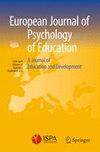Correction to: Parenting and teaching styles in relation to student characteristics and self‑regulated learning
IF 2.8
2区 心理学
Q2 PSYCHOLOGY, EDUCATIONAL
引用次数: 0

更正为与学生特点和自我调节学习有关的父母和教学风格
本文章由计算机程序翻译,如有差异,请以英文原文为准。
求助全文
约1分钟内获得全文
求助全文
来源期刊

European Journal of Psychology of Education
PSYCHOLOGY, EDUCATIONAL-
CiteScore
6.30
自引率
3.30%
发文量
63
期刊介绍:
The European Journal of Psychology of Education (EJPE) is a quarterly journal oriented toward publishing high-quality papers that address the relevant psychological aspects of educational processes embedded in different institutional, social, and cultural contexts, and which focus on diversity in terms of the participants, their educational trajectories and their socio-cultural contexts. Authors are strongly encouraged to employ a variety of theoretical and methodological tools developed in the psychology of education in order to gain new insights by integrating different perspectives. Instead of reinforcing the divisions and distances between different communities stemming from their theoretical and methodological backgrounds, we would like to invite authors to engage with diverse theoretical and methodological tools in a meaningful way and to search for the new knowledge that can emerge from a combination of these tools. EJPE is open to all papers reflecting findings from original psychological studies on educational processes, as well as to exceptional theoretical and review papers that integrate current knowledge and chart new avenues for future research. Following the assumption that engaging with diversities creates great opportunities for new knowledge, the editorial team wishes to encourage, in particular, authors from less represented countries and regions, as well as young researchers, to submit their work and to keep going through the review process, which can be challenging, but which also presents opportunities for learning and inspiration.
 求助内容:
求助内容: 应助结果提醒方式:
应助结果提醒方式:


